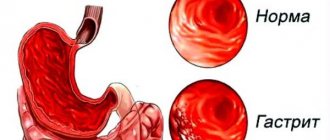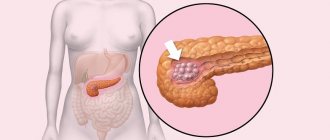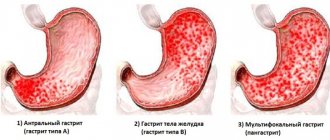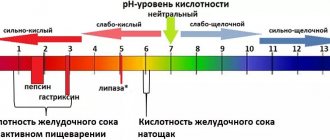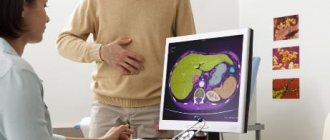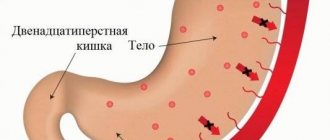Many diseases occur with periods of exacerbation and remission. The above fully applies to chronic gastritis. The disease consists of inflammation of the gastric mucosa. The severity and severity of the disease directly depend on the degree of damage to the gastric lining.
Exacerbation of gastritis often occurs in summer and autumn, which is also recognized as a popular holiday period. Patients relax on vacation, forgetting about medical recommendations, and begin to violate their usual diet. For example, consume more vegetables and fruits than usual. Fiber, found in available southern products, often provokes acute gastritis.
Other exacerbation factors:
- smoking and alcohol abuse;
- immune system disorders;
- binge eating;
- diets for weight loss;
- fatigue and nervous overload;
- intestinal infections;
- interseasonal cooling;
- Helicobacter pylori infection;
- other concomitant diseases;
- taking medications with irritating effects.
Gastritis can worsen quickly, sharply or slowly, gradually, with increasing intensity of symptoms.
Causes of exacerbation of gastritis
The chronic form of gastritis very often worsens with the change of seasons, especially in autumn and spring. The cause of exacerbation may be fruits and vegetables consumed in large quantities in the spring and summer. A sudden intake of large amounts of fiber can have a negative effect on the stomach and lead to an exacerbation of a chronic disease. There are other reasons why gastritis can worsen. These include:
- lack of proper diet;
- constant stress and depression;
- smoking tobacco products;
- frequent consumption of strong alcoholic drinks;
- self-composed diets and fasting;
- Helicobacter;
- frequent overeating;
- serious intestinal infections and disorders;
- poisoning;
- autoimmune disorders;
- gastrointestinal disorders;
- poisoning by chemical substances at work or on purpose;
- dry food;
- frequent consumption of strong coffee, etc.
Signs of chronic gastritis may appear due to one of the above factors. Symptoms may appear gradually, indicating the return of the disease, or appear acutely. The intensity of the symptoms that arise directly depends on the degree of progression of the disease.
Important: If the symptoms of chronic gastritis make themselves felt aggressively, you should contact the clinic. A doctor who can help with the disease is a gastroenterologist.
general characteristics
Acute gastritis appears suddenly when the gastric mucosa is damaged by chemicals, drugs or poor-quality food. Usually its symptoms are so pronounced that most patients immediately consult a doctor. In many cases, this form of the disease requires hospital treatment. But still, in almost half of the patients it is not possible to cure the pathology completely, and it becomes chronic.
Chronic gastritis can also develop as an independent disease. The reasons for this have not yet been clarified by scientists, but it is believed that inflammation of the mucous membrane can be triggered by stress, poor diet, bad habits, as well as infection with the Helicobacter pylori bacterium. In this case, the disease is usually accompanied by abdominal discomfort, indigestion, flatulence, and intestinal upset. Chronic gastritis can occur with low or high acidity of gastric juice. Symptoms may vary slightly.
The chronic form of the disease is characterized by the fact that the condition periodically improves, and such remission can last indefinitely. And at the initial stage of the pathology, the patient does not experience obvious discomfort.
Important: even with a slight violation of the diet or when exposed to unfavorable external factors, gastritis worsens.
Timely initiation of treatment can quickly improve the condition. But in some patients, the duration of the exacerbation can reach several weeks or even months.
With chronic gastritis, the walls of the stomach become inflamed, and there is a decrease in mucus production, which protects them from the aggressive effects of hydrochloric acid. Typically, this process is sluggish and, if you follow a diet, may not cause any symptoms. With increased acidity of gastric juice, ulcers and erosions form on the mucous membrane, which can bleed. All this leads to disruption of food digestion. In addition, the inflamed mucosa reacts sharply to any aggressive influences. An exacerbation of the disease occurs.
Inflammation of the mucous membrane can worsen for various reasons, often ulcers or erosions form on its surface
Unlike acute gastritis, an attack of its chronic form may not appear immediately after exposure to provoking factors, but after several hours. In addition, its manifestations will not always be pronounced; only a slight deterioration in the condition is possible. It is also impossible to say exactly how long the exacerbation lasts. Each patient is different.
Some people immediately change their diet and start taking the necessary medications. Sometimes in this way it is possible to stop the exacerbation in a few days. But in some patients this condition can last indefinitely.
A feature of gastritis is that exacerbation of its chronic form occurs simultaneously in many patients, regardless of behavior and diet. Therefore, they say that this disease is characterized by seasonality, because most patients have exacerbations in spring and autumn. But with a serious violation of the diet and medical recommendations, gastritis can worsen at any time. In the most severe cases, this condition lasts for years, only bringing relief for a short time.
https://youtu.be/3vnz5VrLU10
Signs and symptoms of exacerbation
Consulting a doctor during exacerbation of chronic gastritis should be done immediately if the patient experiences the following symptoms:
- discomfort or pain in the left hypochondrium;
- sudden weight loss;
- loss of appetite;
- headaches, incoordination;
- vomiting and constant nausea;
- dehydration and dry mouth;
- heartburn and reflux;
- constipation or persistent stomach upsets;
- symptoms of intoxication, manifested in weakness, fever;
- bloating and severe gas formation, flatulence;
- blood in stool or vomit;
- tachycardia;
- frequent belching of air or burps with an unpleasant taste;
- painful sensations when pressing in the solar plexus area.
The main symptom of exacerbation of any chronic disease is pain. When gastritis recurs, each patient experiences different symptoms. One patient is characterized by painful, acute signs of the disease, the other suffers from constant nausea and vomiting with bile. Depending on which signs indicate an exacerbation, we can come to a conclusion about the stage of gastritis in a particular patient.
Painful sensations and their intensity may indicate the stage of damage to the gastric mucosa by any factors. Treatment is carried out only with an individual approach from the doctor to the patient and when drawing up a complete clinical picture of the disease.
Important: A gastroenterologist can prescribe a diagnosis consisting of several stages. A gastroscopy, a list of blood and stool tests to check for internal bleeding, x-rays and other possible studies are prescribed. Thus, the therapy will be as effective as possible and the treatment will not take a lot of time.
Even in the presence of a weak, sluggish pain syndrome, the patient should be prepared for the fact that if treatment is ignored, the pain may intensify, become paroxysmal and become acute. When chronic gastritis worsens, you need to be prepared for complications. You can avoid them using therapy prescribed by your doctor.
The intensity of nausea and vomiting may indicate the degree of inflammation of the mucous membrane. These symptoms are individual and depend on many factors, including the level of stomach acidity. When vomiting, you need to pay attention to its composition. Vomit may contain:
- undigested food;
- bile;
- blood clots.
In the latter case, blood clots may indicate an exacerbation of chronic erosive gastritis. If you are vomiting blood, you should contact a gastroenterologist, since blood indicates the presence of internal bleeding, which, if you are not careful about your own health, can lead to death. There may also be blood in the stool. It appears as a dark mass, close to brown or black.
When gastritis worsens, patients often complain of symptoms of indigestion. Patients may experience frequent constipation or diarrhea, bloating, flatulence, pain in the lower abdomen and navel area, intestinal cramps and rumbling in the abdomen.
Can it go away on its own?
Doctors draw patients' attention to the fact that gastritis will not go away without proper treatment. If you ignore its exacerbation and do not adhere to dietary nutrition, as well as drug therapy, attacks of the disease will begin to bother the person more and more often. As a result, complications of the disease, which can be quite serious, cannot be ruled out. The disease leads to gastrointestinal ulcers and bleeding. The most dangerous consequence is stomach cancer, which is sometimes fatal.
Treatment
Exacerbation of gastritis, treatment of which is a necessary measure, can be started independently. When symptoms of the disease appear, the patient must immediately switch to a healthy, light diet type diet. But this is not enough to fully combat the disease. Effective and most effective treatment for chronic gastritis can only be prescribed by a specialist.
Important: If the disease worsens, you should not resort to the advice of friends or purchase advertised drugs and start taking them. Self-medication can lead to significant deterioration.
Only a qualified doctor can help you select the right medications. So, depending on the causes of the disease and pronounced symptoms, doctors may prescribe:
- antiemetic tablets and injections;
- astringents for diarrhea;
- antibiotics;
- painkillers.
A prerequisite for treatment is compliance with the diet prescribed by the doctor. The content of foods in diets depends on the amount and level of acid diagnosed during research.
Traditional methods of combating relapse
It is possible to combat exacerbation of chronic gastritis with the help of folk remedies. A common cause of relapse is high intragastric acidity. Traditional medicine offers several effective methods of treatment for this symptom.
Potato juice can reduce acidity and is often prescribed to patients by doctors. Thus, freshly squeezed potato juice is used as a sedative for the mucous membranes of internal organs. This remedy copes well with heartburn and its consequences. Potato juice also suppresses reflux.
On the contrary, with low stomach acidity, another folk method is used - treatment with cabbage juice. Freshly squeezed juice is drunk slightly warmed in half a glass.
Important: Fresh cabbage juice can cause severe nausea and vomiting. To avoid these symptoms, you should drink cabbage juice 4 hours after preparing it.
Another important element of treatment with folk recipes is medicinal herbs. The following herbs can help relieve pain, nausea, indigestion and heartburn:
- chamomile;
- burnet;
- hay;
- plantain;
- nettle;
- yarrow;
- St. John's wort.
You can overcome the symptoms of chronic gastritis without medications, the main thing is to start using a diet and soothing herbs on time.
If medical help is not available
An attack of acute gastritis often overtakes the patient quickly and unexpectedly. It’s good when emergency assistance is quickly provided by a professional. It happens that at an alarming moment a person is out of town, professional medicine is not available. There are many examples: a fishing trip, picking mushrooms or berries, just relaxing in a secluded place, far from civilization, where nature is magical, but there is no first aid station.
First of all, the acute pain should be removed, the syndrome should be relieved. It is better to use antispasmodics prescribed by your doctor. Usually, people suffering from chronic gastritis do not forget to take such medications with them, putting them in a traveling first aid kit.
If drugs are not available, the described method will provide good results. You need to lie on your side, pulling your knees towards your stomach. Remain in this position for 15 minutes to half an hour, trying to relax as much as possible. It is permissible to apply a heating pad with cold water to the stomach, to the place popularly called “under the stomach.” This relieves the spasm. The feeling of nausea can be relieved at home with a piece of ice or a small slice of lemon.
In the absence of the opportunity to get to a doctor, the indicated simple arsenal of means usually produces good results.
Traditional therapy
It is permissible to use traditional medicine recipes. Folk remedies are mainly herbs in the form of teas and decoctions. Chamomile, oats, flaxseed, celandine and yarrow envelop the stomach, relieve inflammation and pain.
For low secretion, mint, St. John's wort, and plantain are suitable. They improve digestion and increase acid production.
Vegetable and fruit juices have properties that allow you to restore the proper functioning of the gastric glands. Select juices (for example, grape and apple) help the stomach secrete. Cherry and raspberry - reduce production. Vegetable juices include potato, cucumber and carrot juices, which are extremely beneficial for digestion.
If gastritis has worsened, propolis will help. It relieves symptoms quite well. Often improvement occurs already on the third to fifth day after the start of treatment. There are many recipes for using propolis, the simplest is daily resorption of up to 8-10 g of the product on an empty stomach. Naturally, such treatment is possible only in the absence of allergies to bee products.
https://youtu.be/FJ4E8r5D_ao
Oatmeal has long been considered a cheap but effective remedy. Recipe: Soak half a glass of cereal in one and a half glasses of water overnight. In the morning, the water is drained, jelly is cooked from the drained amount with the addition of 1 tbsp. spoons of flour or starch. The drink is drunk before breakfast, and the actual breakfast is porridge made from soaked flakes.
A useful remedy for gastrointestinal diseases is mumiyo. For acute gastritis, a popular recipe is: dilute 0.3 g of mumiyo in a glass of cool boiled water and take twice a day, before meals.
Dietary guidelines during a disease outbreak
Exacerbation of any stage of gastritis should be accompanied by therapy. The first step to healing is following the rules of nutrition.
- You shouldn't eat before bed. Digesting food with the stomach in this case can cause serious damage to it.
- You need to eat often. Three meals a day is wrong. It leads to overeating and metabolic problems. The maximum correct intake of food is about 5-6 times a day.
- Portions should not be large. The ideal meal includes as much food as can fit in two human palms. You need to eat less, but more often.
- It is worth completely eliminating coarse foods from your diet. During an exacerbation, the consumption of heavy food negatively affects the functioning of the patient’s stomach, which leads to a significant deterioration in the course of the chronic disease.
- It is worth completely eliminating a certain list of drinks from your diet. These include sparkling water, coffee, sour juices and fresh juices, strong and mint teas and alcohol. Such drinking can affect the condition of the gastric mucosa and provoke nausea, vomiting and paroxysmal, acute pain.
The key to successful treatment of chronic gastritis is proper and balanced nutrition, the responsibility for which lies with the patient.
How to heal quickly?
Diet food
In order for the exacerbation of the disease to pass quickly, a person will definitely need to follow a diet. With its help, it is possible to improve the activity of the gastrointestinal tract and relieve a person from pain. It is important to adhere to the following nutritional principles:
- Monitor the temperature of the food.
- Eat small meals at least 5 times a day.
- Stop drinking alcohol and smoking.
- Chew food thoroughly.
- When consuming foods that are rich in fiber, grind them in a blender or grind through a sieve.
The following products are allowed to be added to the menu:
- potato;
- bananas;
- oatmeal or rice;
- eggs without yolks;
- lean meat and fish;
- green pea;
- low-fat fermented milk products.
The following foods should be excluded from the diet:
- sweets;
- smoked meats;
- marinades and pickles;
- spices;
- spicy and fried foods;
- citrus;
- strong broths;
- nuts.
Drug therapy
Complex treatment is a condition for success.
Treatment of exacerbation of gastritis is based on stopping the factor that provoked it. If the pathological condition is caused by the bacteria Helicobacter pylori, patients are required to be prescribed antibacterial pharmaceuticals that allow them to cope with pathogenic microorganisms. In addition, patients are also prescribed medications that normalize the acidity of the gastrointestinal tract. Therapy is not complete without medications that can protect the gastrointestinal mucosa. Most often they resort to the help of enzymes.
When exacerbation of gastritis lasts for a long time and patients suffer severe pain, analgesics and antispasmodics are used. When vomiting, they resort to antiemetic medications. If a person is diagnosed with an exacerbation of allergic gastritis, which does not go away for a long time, antihistamines are used. When the pathological condition has been managed, the person is prescribed probiotics, with the help of which it is possible to restore the functioning of the digestive organs.
In general, the duration of therapy is about 3 weeks. The correct medication and the duration of its use can only be determined by a doctor, who will take into account the severity of gastritis and the individual characteristics of each patient.
ethnoscience
In the process of exacerbation, in combination with methods of conservative therapy, it is permissible to use prescriptions from healers. Patients are allowed to resort to sea buckthorn oil, which is consumed 1 teaspoon on an empty stomach. Thanks to it, the recurrence of gastritis will pass faster and the pain syndrome will decrease. Blueberries are considered an effective remedy in the fight against the disease. The fruits of the plant are poured with hot water and infused for 15 minutes. The resulting decoction is consumed three times a day, 100 ml. Healers also recommend using calendula, 50 drops of which are added to 200 ml of hot water. Thanks to this recipe, it is possible to quickly get rid of pain in the gastrointestinal tract.
Exacerbation of gastritis during pregnancy
Gastritis is a very common disease in pregnant women. An exacerbation of a chronic existing disease is more common than the occurrence of an acute form of the disease for the first time. The most common cause of gastritis in pregnant women is severe, obsessive toxicosis. Other reasons include:
- nervous experiences and stress;
- changes in hormonal levels;
- imbalance and nutritional errors;
- compression of internal organs by the fetus.
Treatment of exacerbations of gastrointestinal diseases in pregnant women becomes much more complicated due to the impossibility of using many medications. Medicines can negatively affect the maturation of the fetus and the general condition of the woman. Therefore, gastroenterologists prescribe herbal treatment and mandatory adherence to a balanced diet.
Important: Small weaknesses in nutrition that pregnant women allow themselves can develop into big problems. Chocolate, flour, deep-fried and too spicy can cause pain, bloating, nausea and severe heartburn.
Also, in addition to following certain dietary rules, women are recommended to go for walks more often and lead a mobile and active lifestyle.
